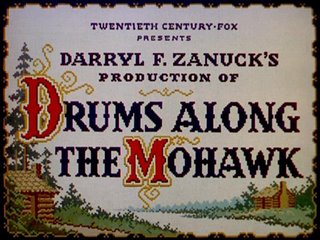 Burbank, September 28, 2007 – Two classic films, John Ford’s DRUMS ALONG THE MOHAWK (1939) and the film noir LEAVE HER TO HEAVEN (1945) were recently restored by DTS Digital Images utilizing the company’s proprietary Lowry Process (PDF). The films will premiere at the 45th New York Film Festival on October 12. The facility, a division of DTS Digital Cinema, provided full, 2K restoration services on both films. The movies are part of the festival’s retrospective program “In Glorious Technicolor: Martin Scorsese Presents,” sponsored by American Express and The Film Foundation. Scorsese will introduce the films and discuss the importance of preservation prior to the screenings.
Burbank, September 28, 2007 – Two classic films, John Ford’s DRUMS ALONG THE MOHAWK (1939) and the film noir LEAVE HER TO HEAVEN (1945) were recently restored by DTS Digital Images utilizing the company’s proprietary Lowry Process (PDF). The films will premiere at the 45th New York Film Festival on October 12. The facility, a division of DTS Digital Cinema, provided full, 2K restoration services on both films. The movies are part of the festival’s retrospective program “In Glorious Technicolor: Martin Scorsese Presents,” sponsored by American Express and The Film Foundation. Scorsese will introduce the films and discuss the importance of preservation prior to the screenings.
“These classic films are an important part of our motion picture history and culture,” says Schawn Belston, vice president of film preservation at 20th Century Fox. “The restoration and preservation of these films was a collaborative effort by Fox, the Academy Film Archive and The Film Foundation. DTS Digital Images restored these and other classic films in our library using the most advanced image processing technology available today. We’re very pleased and excited to see these Hollywood classics projected at the festival.”
DRUMS ALONG THE MOHAWK and LEAVE HER TO HEAVEN were both produced in three-strip Technicolor format. DRUMS ALONG THE MOHAWK was directed by John Ford with Bert Glennon, ASC and Ray Rennahan, ASC sharing the cinematography credit. LEAVE HER TO HEAVEN was directed by John Stahl. Leon Shamroy, ASC earned an Oscar for Best Color Cinematography for his work on the film.
“DRUMS ALONG THE MOHAWK presented some of the most difficult types of restoration challenges,” says Mike Inchalik, vice president, Strategy and Marketing, DTS Digital Images. “We were dealing with film elements that were several generations removed from the original. Because of significant fading of the CRIs (color reversal intermediates) in particular, most of the color information from the blue layer of the original camera negative was gone. There were also tricky issues to resolve, including misregistration, flicker, color breathing and grain build-up and image softening that results from the creation of second and third generation film preservation elements.”
Since the original three-strip negatives were no longer available, DTS Digital Images worked from color reversal protection copies and black-and-white YCM separations to reconstruct the films. Those elements were scanned and converted to digital files using IMAGICA film scanners that are specially designed to gently handle older, shrunken films. The images were then restored using the Lowry Process embedded in proprietary DTS software.
“The Lowry Process incorporates some very powerful imaging algorithms that have been fine-tuned over the course of more than 200 major feature film restorations performed over the past eight years,” explains Inchalik. “We’ve put a great deal of energy into inventing the right tools and putting enough computing power behind them.”
Inchalik notes that the original three-strip negatives had shrunk at different rates. As a result, there was significant misregistration photographed into the color reversal copies.
“There’s quite a science to digitally recombining those records and adjusting for the various rates of shrinkage to create a perfectly recombined registered image,” adds Inchalik.
 In both restorations, DTS delivered a new negative, a digital archive, and a new HD master for serving home video markets that are all true to the restored films. The prints that will screen at the New York Film Festival were made from these new negatives.
In both restorations, DTS delivered a new negative, a digital archive, and a new HD master for serving home video markets that are all true to the restored films. The prints that will screen at the New York Film Festival were made from these new negatives.
“Restoring classics like DRUMS ALONG THE MOHAWK and LEAVE HER TO HEAVEN is a tremendous responsibility that we take very seriously,” says Inchalik. “The breathtaking rate of technological change helps us recover and recreate the amazing experience of seeing these cinematic treasures as they were originally meant to be seen, and that’s exciting. Using the Lowry Process, we have also prepared the films for today’s high-definition home viewing environments, and for whatever formats the future brings as well.”
The Preservation Screening Program was created by American Express and The Film Foundation to screen motion pictures that have been preserved/ restored with funding from the Foundation. The goals are to connect today’s moviegoers with film art and culture from the past, and to highlight the importance of film preservation.
The 45th New York Film Festival runs September 28 through October 14 at the Frederick P. Rose Hall, Home of Jazz at Lincoln Center. The festival, presented by the Film Society of Lincoln Center and sponsored by Sardinia Region Tourism and The New York Times, features showcases, music documentaries and retrospective films. For more information, visit www.filmlinc.com/nyff.
